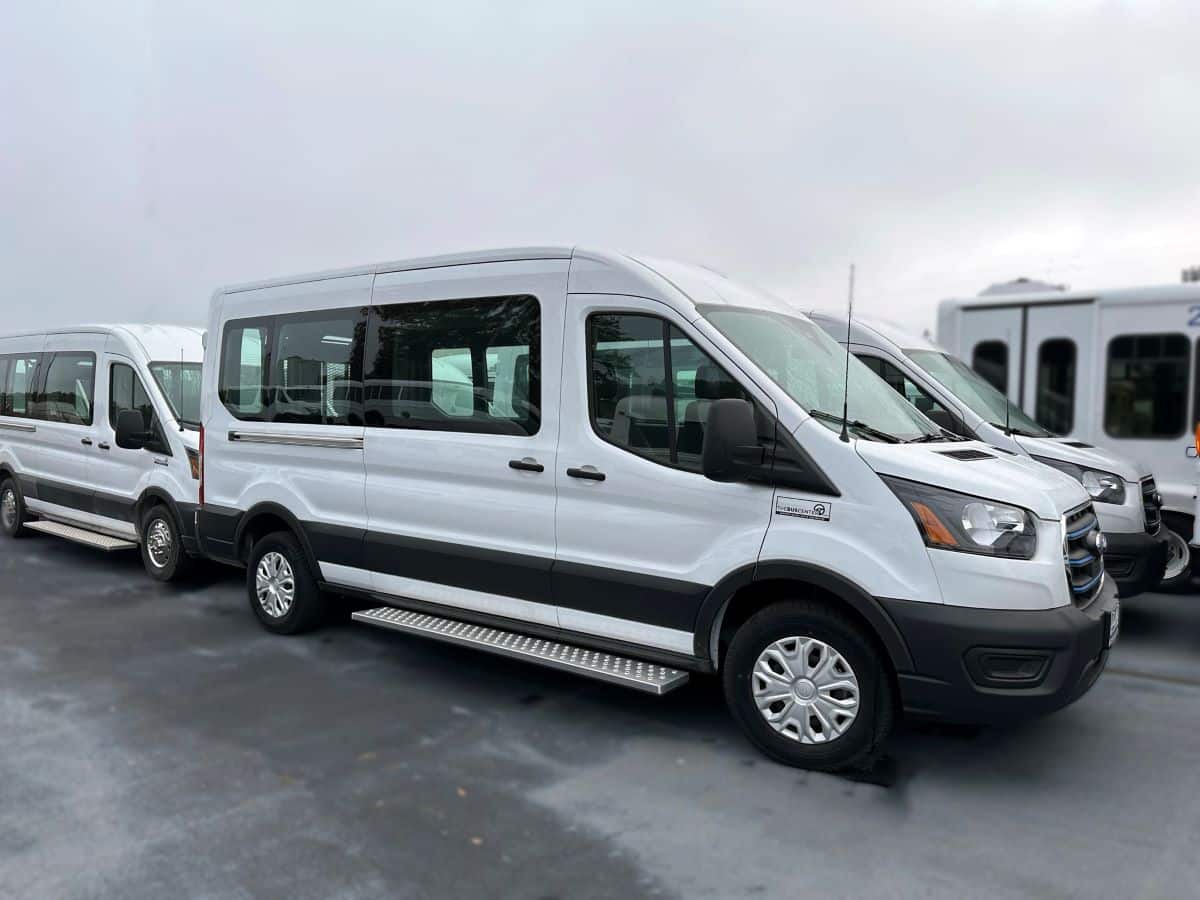One such option of church transportation vehicles is electrifying. Electric vehicles (EV), or battery-electric vehicles (BEV), in the commercial bus and van industry are on the rise and the wave of the future.
Battery-electric transit vehicles are moving toward widespread industry adoption, with major cities making commitments to zero-emission transportation. From tractor trailers to city and school buses, commercial transportation operators are adopting electric vehicle (EV) technologies, resulting in overall cost savings and improved air quality.
With EV adoption on the rise, EV technologies are advancing at a rapid rate. Funding is now more prevalent in vouchers and grants, vehicle range is improving, battery costs are declining, and the vehicles are being proven in real-world applications. Electric means significant savings up to 85% on operating costs. Fewer parts mean lower maintenance costs by up to 66 percent, as electric provides the elimination of almost all engine maintenance, as there are no fluids or filters used in electric motors.
The advanced batteries in electric vehicles are designed for extended life. Several manufacturers of electric vehicles offer 5-year/100,000-mile battery warranties. Predictive modeling by the National Renewable Energy Laboratory indicates that batteries purchased today may last 12 to 15 years in moderate climates (8 to 12 years in extreme climates).
BEVs also allow you to save vehicle downtime with no emission testing. Zero emissions mean cleaner air in communities you serve to the benefit of your drivers, riders and church family at large. Electrification provides a way to invest in environment sustainability for future generations to come.
The electrification of church buses and vans is a great application of the EV because of the potentially low daily mileage used, downtime between trips allowing for midday charging if needed and the ability to provide power back to the grid during peak times, among others. Electric vehicles have the benefit of flexible charging because the electric grid is near most locations where people park.
To safely deliver energy from the electric grid to a vehicle’s battery, a charging station, sometimes referred to as electric vehicle supply equipment (EVSE), is needed. Drivers can charge overnight at a home or church, or workplace or a public charging station when available. Charging equipment manufacturers, automakers, utilities, Clean Cities coalitions, municipalities and government agencies are rapidly establishing a national network of public charging stations.
Two current models provide remarkable electric success for a church bus or van – the Forest River Bus E450 and the Forest River Van.
The Forest River Bus E450 EV is a versatile and trusted platform battery-electric vehicle equipped by Lightning eMotors with a state-of-the-art electric drivetrain, which provides a quiet, smooth and familiar driving experience that your drivers will love. This vehicle allows for up to 25 passengers or 16 passengers plus 2 wheelchairs. Available in 95-mile, 125-mile and 155-mile range versions, this shuttle bus provides practical, reliable service while producing zero emissions on the road.
Charging is simple and quick, with both Level 2 AC charging and DC Fast Charge available, and the thermally managed batteries deliver a top-notch range, efficiency and lifetime with elegant integration with batteries fully under the floor. Regenerative braking dramatically reduces brake wear, and the Lightning Analytics give insight into usage and efficiency, range analysis and driver behavior.
The fuel and maintenance costs for this battery-electric vehicle for a monthly transportation of 450 miles would be an estimated $405 total for fuel costs and $158 in maintenance and other costs. This is an 83 percent reduction and savings for churches when compared to a gas-powered similar commercial shuttle bus, which would cost churches $2,325 in fuel costs and $955 for maintenance and other fees.
If the shuttle bus is too large for what your church needs or if you need to provide for those who may be handicapped, the Forest River Van is a great option for church leaders. With the commercial passenger van emerging as the fastest growing ground transportation segment, the Forest River Van delivers the most versatile product in the market today.
Whether you are transporting riders who may change on a weekly basis and may or may need handicap access, this electric vehicle provides a variety of flexible floor plans and seating configurations. With similar options and capacity as a smaller shuttle bus, the van is a cost-effective option when passenger capacity needs are 14 passengers or less and up to four wheelchairs.
The EV commercial transportation industry can be complex and may require navigation to determine the best route for electric success, but the benefits of EV are significant.
Dealers can help provide churches guidance and instruction on opportunities for federal tax credits and/or how to apply for local and/or state grants and incentives for electric vehicles. EV specialists can steer your organization to your intended destination, wherever that may be.
The Bus Center Family of Companies EV Manager David Nethercut assists his sales teams in developing electrification opportunities within both the commercial vehicle and school bus markets. He has been a highly regarded resource within the transportation industry for more than 45 years with 30 years’ experience in various positions at Thomas Built Buses, known as the Electric Bus Authority.
Founded in 1972, The Bus Center Family of Companies represent the world’s best manufacturers in the world and offer new and used buses and vans for schools, churches, retirement communities, daycares, hotels and more. The Bus Center Family of Companies offers three locations, including Transportation South, Inc. in Birmingham, Ala., Mid-South Bus Center in Murfreesboro, Tenn., and The Bus Center – Atlanta in Austell, Ga. For more information, visit www.thebuscenter.com.







